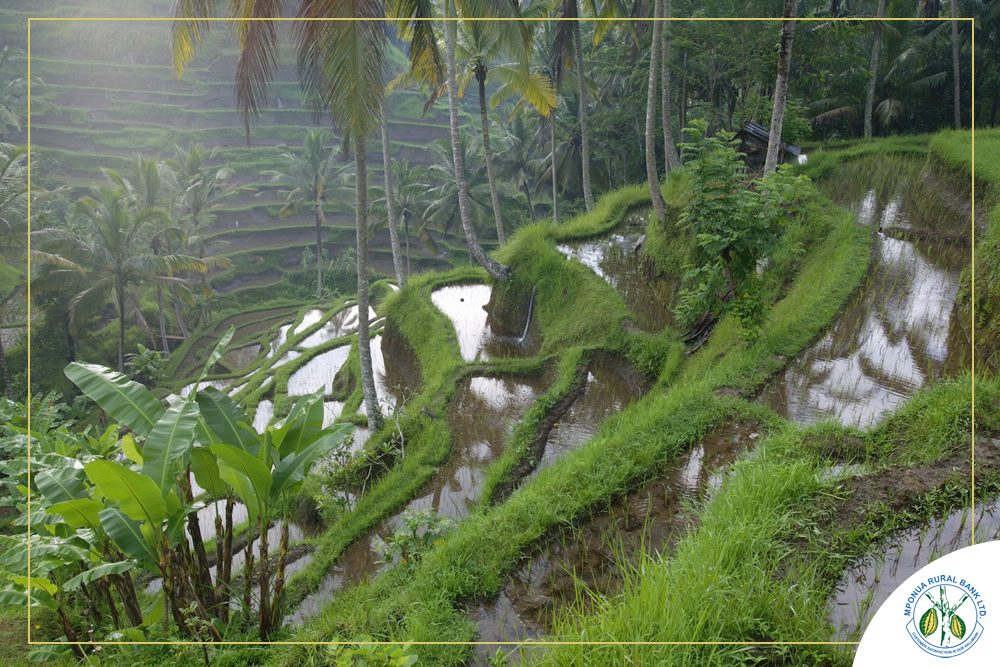Mponua Rural Bank improves lives of communities

The forest area also covers some of the towns and villages in the Asante Akim South District in the Ashanti Region, and is noted for lumbering. Unfortunately like other forests, it is mostly exploited by illegal chain-saw operators.
Although the people in towns such as Amuana Praso and Nwinso, who are mostly farmers and traders, are hard-working, they operate at the subsistence level due to lack of financial assistance and are, therefore, unable to generate the required income to improve their livelihood.
That is because about 30 years ago, the financial institutions nearby were located at Nkawkaw, a distance of about 40 kilometres, making it uneconomical for the peasant farmers and petty traders to access credit facilities at such banks, taking into consideration the seemingly long distance to be covered and the collateral required for the facilities.
Poverty was, therefore, the order of the day and such a situation persisted for a long period until 1983, when a number of people in the area, led by Messrs S. L. Ofori Owusu and P. K. Asante, both chartered accountants, decided to get a financial institution that would offer credit facilities to the people.
The Mponua Rural Bank, right from its inception in 1983, started giving out credit facilities to the people and within a limited period, started yielding good results.
Farming and trading activities boomed and the subsequent impact on the people and private infrastructure in the bank’s area of operation was positive.
However, not long after “disaster struck” as the bank experienced some hiccoughs in its operations, making it impossible to assist customers and the people. In fact, the situation was so bad that it nearly led to the collapse of the bank.
Determined not to destroy the Amuana Praso “Golden Hen”, the bank’s board was reconstituted and in 2007, it embarked on a five-year programme for the bank’s revival to enable it to continue with its financial assistance to the people, its main objective, as well as honour its social responsibility.
The development programme, which was also aimed at improving its corporate image and resources to eventually become one of the most viable banks in the region, worked to perfection.
Its fortunes started improving tremendously, especially in the last few years, reaching its zenith in 2012 with a net profit amounting to GH¢351,188 as against GH¢178,173.01 made in 2011, showing an astronomical 97 per cent increase.
Addressing the annual general meeting of share holders at Amuana Praso at the weekend, the Chairman of the Board of Directors, Mr George Osei Ameyaw, said the bank’s total income within the same period rose from GH¢1.3 million to GH¢1.8 million, a 43 per cent hike while assets also moved up by 29 per cent, from GH¢6.5 million to GH¢8.3 million within the period under review.
With regard to deposits, he told the shareholders that they went up by 25.70 per cent, from GH¢5.8 million to GH¢7.3 million while investment in Government Treasury Bills rose by 25 per cent, from GH¢2.2 million to GH¢2.7 million, all within the stated period.
Such an improvement in the bank’s fortunes made it possible for it to increase loans and overdrafts from GH¢3 million to GH¢4.90 million, a rise by 66 per cent.
Mr Ameyaw gave the breakdown of the loans and overdraft facilities in 2012 as follows: Salaries GH¢1 milliom, agriculture GH¢0.6 million, transport GH¢0.4 million, trading GH¢1.2 million, susu hybrid GH¢0.860 million, micro finance GH¢0.63 million and overdraft GH¢0.15 million.
The loans and overdraft facilities, which covered almost every economic activity, including farming, and social activities, according to the board chairman, have been of tremendous benefit to the customers and the community in general.
In view of that, Mr Ameyaw assured customers of the board’s decision not to relent in offering such facilities.
The bank, he indicated, had also honoured its social responsibility, which include provision of farming inputs to the Birim North District Assembly as well as its neighbour, the Asante Akim South District Assembly, helping in the grading of the Nwinso-Amuana Praso Road and the construction of a footbridge in the Obogu township.
“We have salvaged the bank to give out more credit facilities to the people as well as honour social responsibility, all geared to improve the living standard of the people in the catchment areas,” the board chairman stated to the delight of shareholders, most of whom are customers of the bank.
The role played by the bank in the eradication of poverty among the people, as well as infrastructural development of the area, had won the confidence of the Chief of Amuana Praso, Nana Opoku Agyeman II, who, however, appealed to the bank to lower the interest rate to make the loans more accommodating for the people.
The bank is headquartered at Amuana Praso, where it is constructing a magnificent building. Its present operational headquarters is at Nkawkaw with branches at Obogu, New Abirem, Asankare, Asuboni Rails and Koforidua.
The spreading of its tentacles to such towns would in the near future further improve its fortunes and move it from its present 38th position on the table of rural and community banks in the country to a higher level.
That, of course, will depend on the sustenance of the prudent measures being taken by the board and implemented by the management headed by Mr Victor Adu, the Supervising Manager.
